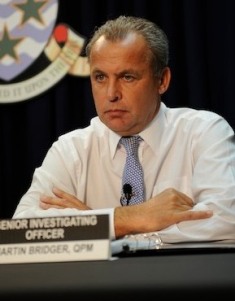Archive for May, 2011

Four robbers target victim in West Bay
 (CNS): While the RCIPS could offer few details, they have confirmed a report of a robbery last night at Batabano Plaza, West Bay, by four men armed with a knife. Police say they received a report that sometime between 11pm and midnight on Wednesday 25 May a man was robbed by four others. The suspects threatened the man, punched him and stole some cash and a camera from his bag. No descriptions are available for the suspects. The man sustained bruising on his arm as a result of the incident. Anyone who was in the area at the time and can provide any information which could assist the enquiry should call West Bay police station 9493999 or Crime Stoppers 8008477 (TIPS).
(CNS): While the RCIPS could offer few details, they have confirmed a report of a robbery last night at Batabano Plaza, West Bay, by four men armed with a knife. Police say they received a report that sometime between 11pm and midnight on Wednesday 25 May a man was robbed by four others. The suspects threatened the man, punched him and stole some cash and a camera from his bag. No descriptions are available for the suspects. The man sustained bruising on his arm as a result of the incident. Anyone who was in the area at the time and can provide any information which could assist the enquiry should call West Bay police station 9493999 or Crime Stoppers 8008477 (TIPS).

Education department pays for dance workshop
 (CNS): The Ministry of Education, Training and Employment sponsored 200 primary- and secondary-level students to attend the Stella Maris Dance Ensemble workshop this week. Education Minister, gave the students $2,000 to cover the costs of the unique opportunity. The dance troupe was brought to Cayman by the Cayman Islands Netball Association (CINA) to raise money for the sport. The workshops were held in conjunction with the fundraiser events for this weekend. Performances are scheduled for 8:00pm on 27 and 28 May and 6:00pm on 29 May at the Harquail Theatre.
(CNS): The Ministry of Education, Training and Employment sponsored 200 primary- and secondary-level students to attend the Stella Maris Dance Ensemble workshop this week. Education Minister, gave the students $2,000 to cover the costs of the unique opportunity. The dance troupe was brought to Cayman by the Cayman Islands Netball Association (CINA) to raise money for the sport. The workshops were held in conjunction with the fundraiser events for this weekend. Performances are scheduled for 8:00pm on 27 and 28 May and 6:00pm on 29 May at the Harquail Theatre.
Students that participated in the workshop will also perform alongside the pros in a special matinee show at 4:00pm on 28 May, also at the Harquail Theatre.
Photo: Rolston Anglin, participating students, Tracey Hydes and Megan Hurlstone CINA President Lucille Seymour and Vice President Norma Ferryman.
Barkers moves to tourism
(CNS): Although it has been a goal of the Department of Environment for over a decade to make Barkers a protected national park, the concept appears to have been moved into the premier’s tourism ministry. An announcement by the governor in the Throne Speech on Monday that Barkers would be expanded and designated a national park with its own park rangers was coupled with a notice in the gazette of a compulsory purchase order of land to expand the proposed park, signalling changes ahead for a site that is considered an important environmental area. Despite its scientific and ecological significance, it appears Barkers is to be managed as a tourism attraction and not by the islands' conservation experts.
The DoE confirmed that the 3.8 acres of land in question is within the boundaries of the proposed Barkers National Park (BNP) and that the department has not had any involvement in the compulsory purchase of the land. The department also stated that the Park Rangers which have reportedly been hired are not employees of the DoE and it had not been informed that staff were being taken on to work inside the park.
“It is unclear to the DoE exactly how the Park will be established and managed as there is no legislation that allows the creation of National Parks. This is an area that is covered in the Draft National Conservation Law,” a spokesperson told CNS.
Back in 2001/02 the environment department was the government agency steering the proposal to establish the country’s first national park at Barkers because of the natural significance of the area which also has beautiful untouched beaches, areas of swamp and mangrove and is home to a number of unique flora and fauna.
With that goal in mind, the DoE began meetings and discussions with the stakeholders, such as the horse-riding businesses based there and the land owners in the area, as well as with the wider West Bay public. Through the public consultation, the department said it managed to achieve consensus on a common vision for the Park.
“The DoE is concerned that the general public’s trust in the department could be eroded if the current plans, of which we have no knowledge, vary significantly from the generally agreed vision for the proposed BNP,” the DoE said in this week in the wake of the announcements.
In a speech delivered by Duncan Taylor in the Legislative Assembly Monday, government had outlined its broad goals for the portfolios and ministries. The expansion of Barkers was listed in the plans for the Ministry of Tourism. However, it was not made clear under what legislation or how the new national park will be designated or managed, in terms of conservation, if it is to become a tourism attraction.
The governor said the ministry was in the process of securing additional property and had already employed park rangers. “This will protect important aspects of our natural resources and culture, while again enhancing our tourist attractions,” he said. According to the gazette, government is purchasing block 9a parcel 99, a plot which is over 3.8 acres, under the land acquisition law.
Although often believed to be a national park, Barkers was never designated as such and there is no legislation to protect the area. The goal, however, was to create the first land based environmental sanctuary at Barkers, which covers over 261 terrestrial acres coupled with the more than 2,036 marine acres that are already protected under the Marine Parks legislation.
It is a unique, diverse and environmentally valuable coastal eco-system that, despite considerable development pressure throughout the rest of the peninsula, has remained largely undisturbed. The area is a prime example of untouchedlow elevation Caribbean beach ridge vegetation, a native and diverse coastal forest community of ironwood, silver thatch, wild cocoplum, broad leaf and other species.
The ponds and extensive mangrove wetland area already provide feeding, breeding and passage grounds for a variety of bird species and the land had been earmarked by the DoE as a potential burrowing ground for a planned re-introduction of the endangered endemic Grand Cayman Blue Iguana.

Teen binge drinking is major concern, says NDC
 (CNS): In the wake of the recent results of the student drug survey, the National Drug Council executive director says one of the major concerns for the organisation is the issue of binge drinking, which can be more dangerous to the individuals and society as a whole than even persistent heavy drinking. Although the NDC said the decline in the number of young people using drugs or alcohol was positive data to report, the evidence of an increase in binge drinking among students that were using drugs and drink poses significant risks. The survey found that students having had a drinking session where they had more than five drinks in one sitting had double compared to previous research.
(CNS): In the wake of the recent results of the student drug survey, the National Drug Council executive director says one of the major concerns for the organisation is the issue of binge drinking, which can be more dangerous to the individuals and society as a whole than even persistent heavy drinking. Although the NDC said the decline in the number of young people using drugs or alcohol was positive data to report, the evidence of an increase in binge drinking among students that were using drugs and drink poses significant risks. The survey found that students having had a drinking session where they had more than five drinks in one sitting had double compared to previous research.
32.1% of students in 2010 admitted a binge drinking session two weeks before the survey compared to 15.2% in the 2006 research. While overall alcohol use in Cayman was lower when compared to research conducted in Canada and the US, when it came to binging Cayman kids were drinking more heavily than their North American counterparts. While 5% of eighth graders in Canada admitting binging and 8% in the US, 22% of kids in 8th grade here in Cayman said they were binge drinking.
“The NDC does have concerns in regards to alcohol use and binge drinking as we know binge drinking poses significant risk to the body and to society as a whole,” the executive director of the NDC Joan West-Dacres said about the findings.
She said that expert studies have revealed that it's not chronic heavy drinkers who have the highest risk of alcohol-related injuries but moderate drinkers who sometimes drink heavily who are more like to suffer injuries, especially while they are drinking. Research reveals that at highest risk in both sexes are those who usually consume moderately but sometimes binge drink.
The NDC also noted that according to the centre for disease control and prevention binge drinking is associated with many health problems, from sexually transmitted diseases to a catalogue of cardiovascular diseases. Un-intential injuries, sexual assault, domestic violence, unintended pregnancy are all associate with binge drinking as well as the obvious issues of alcohol poisoning, liver disease and aggravation of diabetes.
West-Dacres stated that the key to addressing the issue lay with education. “We know that the more awareness and education that is provided, students have a greater opportunity to make better choices,” she said.
To keep young people off drugs (including drink) there needs to be “vigorous, ongoing and comprehensive education and prevention programmes in our schools and in our communities” to provide families, groups and organisations with the information to help young people make healthy choices. “Children should be provided with age appropriate materials and information from a very young age,” the executive director added.

Owners need to get in touch with ‘business feelings’
 (CNS): Businesses progress through time in various and quite obvious set stages and understanding which stage your own business is at is crucial if you want to remove the barriers to its growth, master business coach, Glyn Heald said this week. Speaking at a special seminar, the former Global CEO of business coaching firm Shirlaws explained that getting in touch with feelings about a business is just as important as strategies and planning. Drawing out a time line for any business, Heald detailed the various stages that business owners could expect to face during the life of their business and the corresponding emotions the owner could anticipate experiencing.
(CNS): Businesses progress through time in various and quite obvious set stages and understanding which stage your own business is at is crucial if you want to remove the barriers to its growth, master business coach, Glyn Heald said this week. Speaking at a special seminar, the former Global CEO of business coaching firm Shirlaws explained that getting in touch with feelings about a business is just as important as strategies and planning. Drawing out a time line for any business, Heald detailed the various stages that business owners could expect to face during the life of their business and the corresponding emotions the owner could anticipate experiencing.
Heald was brought to Cayman this week by business consultant Tom McCallum, who has himself recently joined the firm to establish a practice in the Cayman Islands.
The business coach said that day one for business owners brings excitement which moves into a more frantic stage of being as the business owner realises they have to do everything themselves.
The first brick wall for the business owner may occur at any time in the life cycle of the business, but, Heald assured the audience, it would come. Getting through that brick wall (such as making a decision to expand or take on more staff) usually brings on a period of inward investment which should move the business on to what Heald described as “the good times”.
Using a seminar attendee’s personal experience of developing his own pharmacy business as a real example of this onward movement, Heald encouraged the pharmacist to talk through his own experience.
Mimicking Heald’s charting of a business almost to the letter, the pharmacist concurred that his business had started the same way.
Following the good times period comes what Heald termed “payback”, generally a short period of time when the business suddenly grows exponentially, i.e. payback for all the hard work and investment ploughed into the business in earlier times.
“It’s at this time that you might consider selling the business,” Heald said.
At this point the business suddenly takes off, the business owner’s standard of living usually increases, as do their costs.
“This is a time when marriages feel the strain as the business owner might feel that as they increase their standard of living they might also want to upgrade their partner!” Heald quipped; although the serious point was made that strain starts to become apparent on the business owner at this point in a business’s cycle.
Once finished its steep upward curve, the business will most likely then hit another brick wall, but this time it’s much larger and harder to break through. “It’s at this point that the business owner maybe feeling considerable pain,” he confirmed.
The pharmacist concurred and said that he had experienced growth and took on a new business partner, which initially aided growth but then a parting of the waysoccurred, which was his own major brick wall.
Business owners usually feel pain and frustration during these difficult times because they have moved away from doing what they are best at and have to become more focussed on management and staffing issues.
“You go into business because you’re either good at selling or making something,” Heald said. “Now you become frustrated because you might not be giving the same service you originally promised your customers.”
The business owner was generally the first person to experience such feelings, with the business as a whole lagging behind. It was usually at this crisis point that business coaches such as Shirlaws were brought in to assist in turning around the business.
“But we would be far happier seeing a business at the good times stage,” Heald confirmed, “then we can hopefully get the business through the major brick wall at a much quicker rate, turning that stage into really just a period of transformation,” he explained.
All businesses would follow the same model, Heald said, including hitting the major brick wall, but business coaches could provide business owners with the skills they needed to get them through it unscathed. Such skills included understanding the positioning of the business, i.e. why they were in business in the first place, as well as appreciating how the business could attract new channels to the market.
Having clearly defined roles within the business were key, as were ensuring staff were skilled enough to handle this second brick wall. Succession planning was also a key to getting the business through this major brick wall to the next level of expansion, which Heald termed advanced growth.
“If you get to that stage the general feeling of a business owner is pride,” he said, confirming that this was another good time to sell the business.
The only alternatives to advanced growth were bankruptcy or a plateau, neither were desirable outcomes. Heald said that business owners could not let their business plateau: “It’s a fallacy that you can retain a business on a plateau just to keep the lifestyle; youhave to work at it,” he said.
The hardest part for any business owner was positioning the business for sale, because to do that they had to make themselves redundant.
“People shy away from this,” he said. “They treat the business like a member of the family. They liken the feeling to having to sell a child. But it’s a fact that if a business owner is integral to a business that they want to sell, they will lower its value.”

Cops charge suspect bakery robbers
 (CNS): More than seven months after their arrest two teens have now been charged in connection with a robbery that occurred last September at a bakery store in West Bay. The young men aged 18 and 19 years are scheduled to appear in court next Tuesday (31 May) to answer to charges of robbery and possession of an imitation firearm with intent to commit robbery at the Caribbean Bakery on Mount Pleasant Road on 29 September. The robbery took place on a very rainy day just before noon when the armed assailants escaped with a small amount of cash after threatening a female member of staff. (Photo Dennie Warren Jr)
(CNS): More than seven months after their arrest two teens have now been charged in connection with a robbery that occurred last September at a bakery store in West Bay. The young men aged 18 and 19 years are scheduled to appear in court next Tuesday (31 May) to answer to charges of robbery and possession of an imitation firearm with intent to commit robbery at the Caribbean Bakery on Mount Pleasant Road on 29 September. The robbery took place on a very rainy day just before noon when the armed assailants escaped with a small amount of cash after threatening a female member of staff. (Photo Dennie Warren Jr)
The police helicopter was deployed in the wake of the robbery and police arrested three teenagers soon after the incident. Officers were seen arresting two of the young men close to the entrance of The Shores along Batabano Road and the third suspect was apprehended along Mount Pleasant Road.
Police gave no details regarding the reasons for the longdelay in charging the teens with the crime.

Bridger left out on legal limb
 (CNS): Full story — As arguments opened in court today between teams of attorneys over claims made by former police commissioner Stuart Kernohan, it was revealed that the Cayman government's legal team was no longer representing the former senior investigating officer of Operation Tempura, Martin Bridger. As Martin Griffiths QC, who is representing the attorney general and the governor, argued to have the former and current governor (who is now cited on the new claim) and other issues struck from the writ, the question of why Bridger was no longer being represented by the AG’s office was said to be part of a closed ruling made some weeks ago by Justice Charles Quin.
(CNS): Full story — As arguments opened in court today between teams of attorneys over claims made by former police commissioner Stuart Kernohan, it was revealed that the Cayman government's legal team was no longer representing the former senior investigating officer of Operation Tempura, Martin Bridger. As Martin Griffiths QC, who is representing the attorney general and the governor, argued to have the former and current governor (who is now cited on the new claim) and other issues struck from the writ, the question of why Bridger was no longer being represented by the AG’s office was said to be part of a closed ruling made some weeks ago by Justice Charles Quin.
Bridger, who is now one of five people listed in the claim, was represented at the hearing by local defense attorney Anthony Akiwumi, who has not yet made submissions in connection with his new client. The judge queried a number of times why he could not know the reason that the attorney general, who is also listed in the claim by Kernohan, was no longer acting for Bridger.
Sir Alan Moses of the UK Court of Appeal, who was brought in especially for this hearing, described the entire case relating to Operation Tempura as “opaque and bewildering” but also questioned why Bridger had been “hung out on a limb”. He said that this gave the appearance of adding fuel to the conspiracy theories alleged by the plaintiff (Kernohan) in his latest statement of claim.
The main focus of the current hearing, which opened in a public court on Thursday morning, is for the judge to rule on exactly who will be named in the claim when the case itself is heard, the circumstance of how far the claim will go and the issue of security of costs in the event that Kernohan was to lose.
The writ filed by Kernohan names the former governor Stuart Jack, the current governor Duncan Taylor, Attorney General Samuel Bulgin, the former acting commissioner James Smith and the actual Operation Tempura senior investigating officer Martin Bridger. In response to the writ the AG's legal team is claiming that the only defendants who should be considered in the actual claim are the Attorney General's Office and Bridger.
Kernohan, who was fired in 2008 when he refused to return to the Cayman Islands during the Tempura investigation, despite the orders of the then governor Stuart Jack, says that the people listed in his claim were all directly involved in his suspension and subsequent sacking and they acted in bad faith.
The former top cop was one of three senior police officers removed from office during the discredited Tempura corruption investigation but he was never charged with any misconduct relating to the investigation or found to have committed any act of wrong doing.
He states that the governor and the attorney general were both party to the decision to allow two Cayman Net News employees to go looking for evidence of a corrupt relationship between the owner of the local newspaper Desmond Seales and Deputy Commissioner of Police Anthony Ennis, so they should never have suspended him for that decision. Kernohan claims that by doing so both men are as liable as Bridger for the subsequent chain of events.
Griffiths argued, however, that if Kernohan has a case at all it is nothing more than a wrongful dismissal and the former governor cannot be personally liable for that. Griffiths claimed that Kernohan was not sacked because of his part in Operation Tempura or the alleged break-in to the newspaper offices by the employees but because he refused to come back to work, as he tried to steer the arguments away from the now notorious UK police investigation.
Answering the allegations by Kernohan of misfeasance in a public office, the AG’s attorney argued that the plaintiff had not offered anything like enough evidence for that to stand up and therefore he should not be allowed to make the claim.
Despite taking most of the day to present his case, Griffiths essentially argued that the suit should be edited down to a wrongful dismissal case against the attorney general and Martin Bridger. He also said that the financial claims made by Kernohan should be limited to the terms of what remained on his employment contract – which would amount to nine months pay and benefits — although he said that Kernohan’s attorneys should, according to the rules of the court, spell out that figure.
The UK based QC representing the AG also asked for costs in security of around $75,000 as he described Kernohan as an “extremely mobile and evasive plaintiff” that would prove difficult to enforce any financial judgment against were his claim to be unsuccessful. Thelawyer said that the legal team had already had to employ a private detective to track Kernohan down as his attorneys had failed to provide an address. Griffiths revealed that the former top cop was now living in Pasadena, California, where he is understood to have been completing his helicopter pilot’s license.
Kernohan’s legal team made a start on arguments of his behalf before the court was adjourned and said they stuck by their claim that this was a case of bad faith and in short the entire episode was outrageous. Andrew Hogarth QC, who is arguing Kernohan’s case, pointed out that the allegations they hoped to prove “were very serious”.
The core of the former police officer’s claim is that as Jack and Bulgin both knew what course of action Kernohan had taken in regards to trying to find evidence of leaks of police information to the owner of Net News, and to allow him to be suspended six months later for that action amounted to misfeasance and essentially an attempt to cover up their own culpability in the decision. Kernohan is also accusing all of the players of bad faith over the fact that a ruling made by the chief justice in refusing a search warrant to Bridger for Kernohan’s home had exonerated him even before he was suspended from office. This ruling however was not revealed until after he had been dismissed.
Hogarth will continue submissions on behalf of Kernohan spelling out why the governor, in particular, needs to remain on the writ and why the claim is much more than a case of wrongful dismissal. Lord Justice Moses said he would sit through Saturday if necessary to give the lawyers chance to thrash out all their arguments while everyone was present in the Cayman Islands in order to clarify exactly what and who will be in Kernohan’s claim when the case itself is eventually heard.

HSA issues health warning on illegal medication
 (CNS): Following several cases where patients have suffered life-threatening conditions resulting from drugs procured locally from unauthorized people, Health Services Authority (HSA) Medical Director, Dr Greg Hoeksema is warning the public to never take any illicit or unfamiliar medication – prescription or otherwise. In the health and safety warning, Dr Hoeksema emphasises that registered healthcare professionals such as physicians, dentists, optometrists and podiatrists are the only persons who can prescribe medicine.
(CNS): Following several cases where patients have suffered life-threatening conditions resulting from drugs procured locally from unauthorized people, Health Services Authority (HSA) Medical Director, Dr Greg Hoeksema is warning the public to never take any illicit or unfamiliar medication – prescription or otherwise. In the health and safety warning, Dr Hoeksema emphasises that registered healthcare professionals such as physicians, dentists, optometrists and podiatrists are the only persons who can prescribe medicine.
“Unless designated to do so by the law, it is illegal to give out prescription medication to anyone. Moreover, many drugs, even over-the-counter, can produce adverse consequences, from side effects to allergic reactions and other potential risks, including death,” he said in a release from the HSA. “Our recommendation therefore, is to always check with your doctor or pharmacist about how, when and where to take medications.” He cautions the public to check the labeling and to buy only from reputable sources such as registered pharmacies and healthcare facilities.
“Take the necessary steps. If it is not labeled, do not take it; if it is labeled, but looks unfamiliar or comes from an unknown source, research the drug or ask your pharmacist before taking it,” Dr Hoeksema stated.
Chairman of the Pharmacy Council David Pellow reiterated this advice adding that patients should beware of counterfeit drugs. “There are many unscrupulous manufactures, distributors and suppliers in the world today and the counterfeit drug business is threatening the chances of improved health for the public,” Mr Pellow said. “Many of these illegal pharmaceuticals do not contain any or the appropriate amount of active ingredients and may even contain harmful ingredients. So please make sure you know what you take.”
Before taking medication ask these questions:
• What is the name of the medication, and what is it supposed to do?
• When and how do I take it?
• Should I avoid alcohol, any other medications, foods, and/or activities?
• What are the common side effects?
• What are the dangerous side effects and what should I do if these happen?
Before taking medication, be sure to:
• Know what your medication is supposed to do. Should it eliminate the illness or cope with the symptoms?
• Read the label. Ask the pharmacist if you think what you've been given is not what the doctor prescribed, or is the incorrect amount or dosage.
• Heed any label warnings, such as taking medications before or after eating, or vehicle driving / equipment operating safety.
• Keep prescription and non-prescription medications out of children’s reach.
• Keep medications in their original childproof containers so you will have the label, instructions, expiration date and information for ordering a refill, as needed.

GT grocery store robbed at gunpoint
(CNS): No one was injured and no shots were fired as a single armed man robbed the McRuss Grocery Store on Party Lane in George Town last night. Police say they received a report that the robbery had taken place at 8:50pm on Wednesday, 25 May, by a man described as brown skinned, about 5 feet 5 inches tall, and wearing blue jeans, a green camouflage jacket, black gloves and a black ski mask. The cashier at the store told officers that the man had entered the store armed with a handgun and demanded cash from the till. She had handed over the days takings and the offender had fled on foot.
Police are appealing for witnesses who saw this man acting suspiciously prior to entering the shop or when he fled after committing the robbery.

IT touted as cost solution
 (CNS): The government is planning to introduce more and expand existing on-line and e-services in the hope of making it more efficient for less money. In the Throne Speech delivered to the Legislative Assembly on Monday by the governor, the government has cited the use of information technology as a cost cutting solution for delivering services and information to the public. Duncan Taylor said that computer services would be expanding online government services and implementing advanced automation and business reporting systems. “These efforts will help government agencies increase efficiency, without increasing staff numbers,” he said.
(CNS): The government is planning to introduce more and expand existing on-line and e-services in the hope of making it more efficient for less money. In the Throne Speech delivered to the Legislative Assembly on Monday by the governor, the government has cited the use of information technology as a cost cutting solution for delivering services and information to the public. Duncan Taylor said that computer services would be expanding online government services and implementing advanced automation and business reporting systems. “These efforts will help government agencies increase efficiency, without increasing staff numbers,” he said.
Computer Services’ expansion of the electronic document management system will offer government agencies the ability to revamp processes and procedures, improve workflows, and minimise costs for storing and manipulating paper documents, the governor said. Fom paying fines on-line at the court to submitting information to the Cayman Islands Gazette website, government will be using the internet for more services.
He also said that civil servants would be offered “blended e-learning” to provide them with targeted, accredited training and qualifications through the Civil Service College, in partnership with top universities.
The governor spoke, too, about introducing video links to the prison to reduce the number of journeys inmates on remand have to make to and from the court, which would be both a cost cutting and safety measure. The country’s planned CCTV project will also depend on the upgrading of technology to improve community security.
The Department of Vehicle and Drivers’ Licensing finally has plans to develop e-services for the renewal of drivers’ and vehicle licenses, allowing people to pay on-line and avoid one of the islands' most notorious queues. At Lands and Survey, scanning of all survey files is also expected to be completed this fiscal year to allow full online research facilities for licensed land surveyors and department staff.
The government has been slow to take advantage of the possibilities offered by new technology and in particularly delivering services, the ability for people to pay on line and providing information. Despite having set up an e-business commission, government departments are still not offering comprehensive e-services.
Although nearly every government department and public authority has a website, few utilize them to their full advantage. Many have not been updated since they were established as a tool to assist with the implementation of the Freedom of Information Law.
Speaking at a Chamber of Commerce “Be informed” series presentation on Wednesday evening, the deputy chief officer in the Ministry of Labour talked about plans to re-organise labour, training and pensions. In his speech Vaughan Carter pointed to the fact that the job placement unit is still attempting to match employers to employees with manual lists of candidates and jobs. Immigration and labour service are two areas in particular that many believe could dramatically improve government efficiency and cut costs if more oftheir services were available on line.
However, given that customs has only just begun accepting payments at the office by credit card, any immediate expectations of a revolution in e-government may well be disappointed.